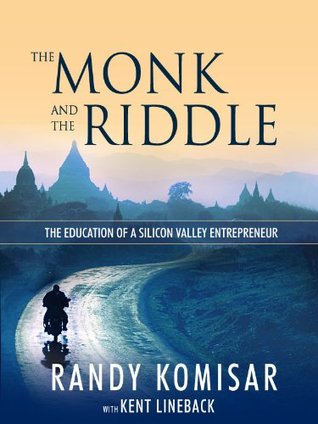More on this book
Community
Kindle Notes & Highlights
No matter how hard we work or how smart we are, our financial success is ultimately dependent on circumstances outside our control.
The Monk encourages us to consider how we spend our time, not our money.
most people are far more successful working at things they love.
few of the most respected venture capitalists let me know that The Monk captured the underlying passion and reason for doing what they do—the chance to turn ideas into viable enterprises that can change the world and to prosper in the process.
the answer lies not in dollars and cents, but in who we are and what we believe.
I expect that in people who found companies. They have to be a little irrational, passionate beyond analysis. If they don't believe in the face of doubt, they'll never make it.
Both sets of grandparents left their homelands for a new and unknown world. It was a courageous bet on a vision, simple faith. I see a common gene among immigrants and entrepreneurs who strike out from the pack to pursue their dreams. I admire people who are willing to bet everything on a belief. Some of these risk takers, whether immigrants or entrepreneurs, have a profound impact on what happens in the world. They place bets on the future, often against fantastic odds. I see heroism in that.
VCs have no percentage in telling you “no” outright. A “no” from a venture capitalist is as rare as the “no” of a Japanese salaryman.
VCs, I explained, want to know three basic things: Is it a big market? Can your product or service win over and defend a large share of that market? Can your team do the job?
“Will it change the way the world operates? Will it change people's lives in any meaningful way?”
There are too many unknowns. You'll need people capable of navigating without street signs. The composition and experience of the team are something VCs will look at hard.”
VCs invest first and foremost, I explained, in people. The team would have to be intelligent and tireless. They would need to be skilled in their functional areas, though not necessarily highly experienced. Moreover, they would need to be flexible and capable of learning quickly.
This team would have to be comfortable with uncertainty and change. That's why VCs look for people with some startup experience, people who have proven they can thrive in chaos. It significantly reduces the risk of failure.
most VCs (even if they insist otherwise) simply don't have the time to give close management attention to the companies they've funded.
Silicon Valley really operates on momentum. Many times I caution a company not to take the largest valuation they can in a financing, because it sets the wrong expectations and probably attracts the wrong investors.
Peg the round at the highest reasonable price necessary to raise the desired amount from the right investors. The right investors bring credibility, experience, and networks.
The right amount to raise is a range with a minimum, but seldom a relevant maximum.
raise enough for a year's burn rate, or net loss, assuming the worst. Then add on enough for another six months, and take anything reasonably offered above that.
Sometimes I do put money into companies, but generally not in the startups I work with. If I invest, I am prone to think like an investor, favoring my return over what's best for the team and often its long-term business.
business isn't primarily a financial institution. It's a creative institution. Like painting and sculpting, business can be a venue for personal expression and artistry, at its heart more like a canvas than a spreadsheet.
that it is important first to evaluate every aspect of a new idea with analytical precision but that, in the end, the decision to fund or move on is a matter of instinct.
He would pull his support in an instant if he felt a founder wasn't cutting it.
My Providence was this: What started as a way to fill time and pay my way while I figured out what career to pursue turned into something unexpectedly rich and fulfilling. But it wasn't any one single part of this life that excited me. It was the aggregate. All the pieces fitting together gave me satisfaction and energy. I was passionate about the whole: No one particular part attracted me to the exclusion of everything else. Each part excited me fully while I was doing it, for the moment I was doing it.
I enjoyed sitting down, analyzing a problem, and then concocting a bunch of free-form solutions. I might have simply reinvented the wheel, made a hexagon instead of a circle, but I could get it rolling, and I wasn't afraid of venturing outside my realm of comfort and experience.


